How to Mulch Your Vegetable Garden?
Last Updated on December 21, 2022
How to Mulch Your Vegetable Garden?
Mulching a vegetable garden can benefit the soil and the plants in many ways, although mulch often goes unnoticed in the garden. Besides preventing weed growth, mulch adds nutrients slowly, conserves soil moisture, and protects roots from extreme weather conditions. Look at the following article to find out how mulch can help your plants flourish. Below you will find a wealth of information about mulching.
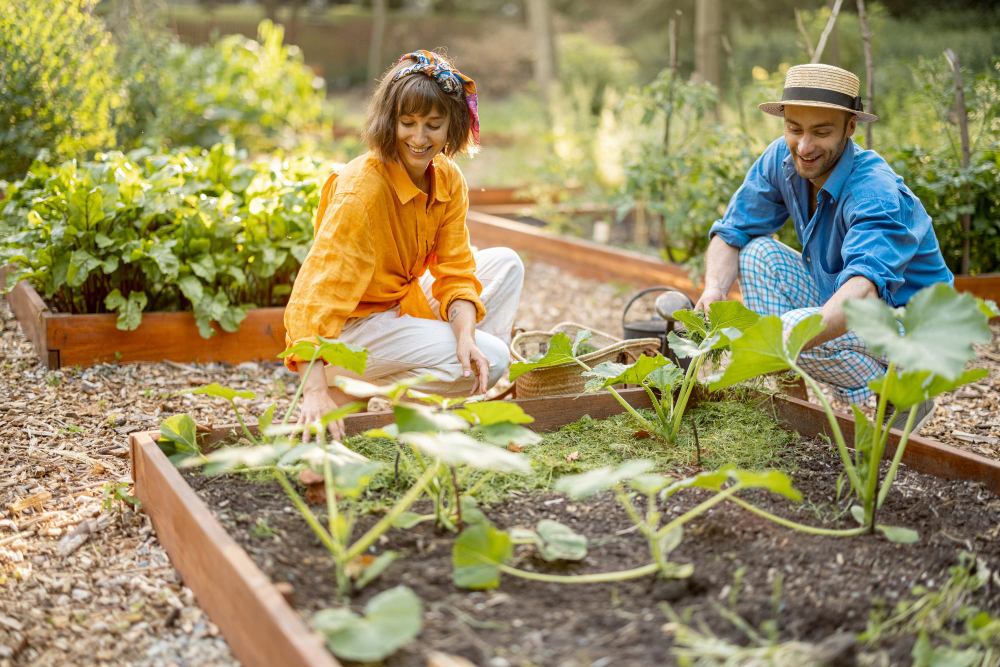
What is Garden Mulch?
Mulches are loose coverings or sheets of material placed on the top of the soil surface to protect it. You can apply mulch to bare soil or cover compost lying on a shelf in a container to keep it moist and protected from the elements. Blocking direct sunlight and drying winds provides a physical barrier to the elements.
Also, mulches can include nutrients released slowly. Worms increase soil moisture retention, free-draining, and fertility by taking mulch into the soil.
What Materials Used for Mulching Vegetable Gardens?
It is possible to mulch a vegetable garden with various types of materials. Several factors can influence what you choose to mulch your garden. Some standard methods of covering garden soil are listed below:
Mulching Vegetable Garden with Straw
By mulching the vegetable garden with straw, you can significantly improve plants’ health and productivity while saving time and money. Straw refers to the dried stalks after harvesting crops such as wheat, rice, barley, or oats. Following the removal of the heads to make grain, the stalks are dried and then bundled tightly into bales. You can break them up and use them for mulch or layer them on the soil surface in a garden so that plants can benefit from them.
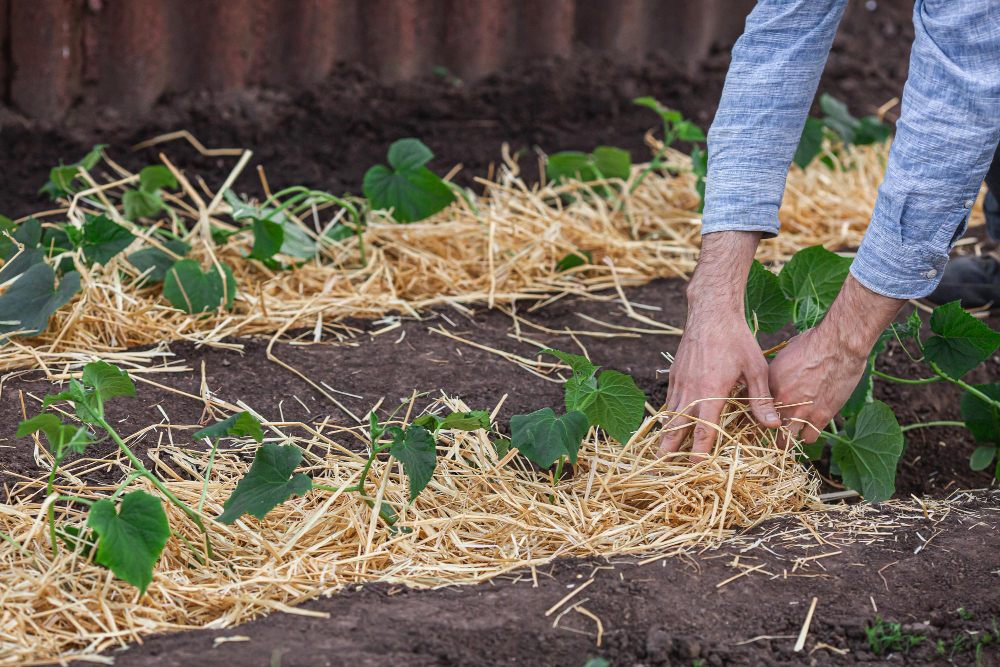
Mulching Your Vegetable Garden with Newspaper
Mulch made from a newspaper is excellent for suppressing weeds. This method can prevent prolific garden plants from growing past their intended location and inhibit weed growth. You can mulch with a newspaper the way you would with shredded paper. You would lay down a few sheets of paper at a time, water them lightly, cover them with soil, and plant.
Mulching Vegetable Garden with Hay
Hay makes excellent mulch for flowers and vegetables. You’ll have a rich layer of nutrients on your plants as it composts when you try mulching the vegetable garden with hay. Seeds and starter plants benefit the most from this. With the hay, they have warm, moist, and nutrient soil and cover.
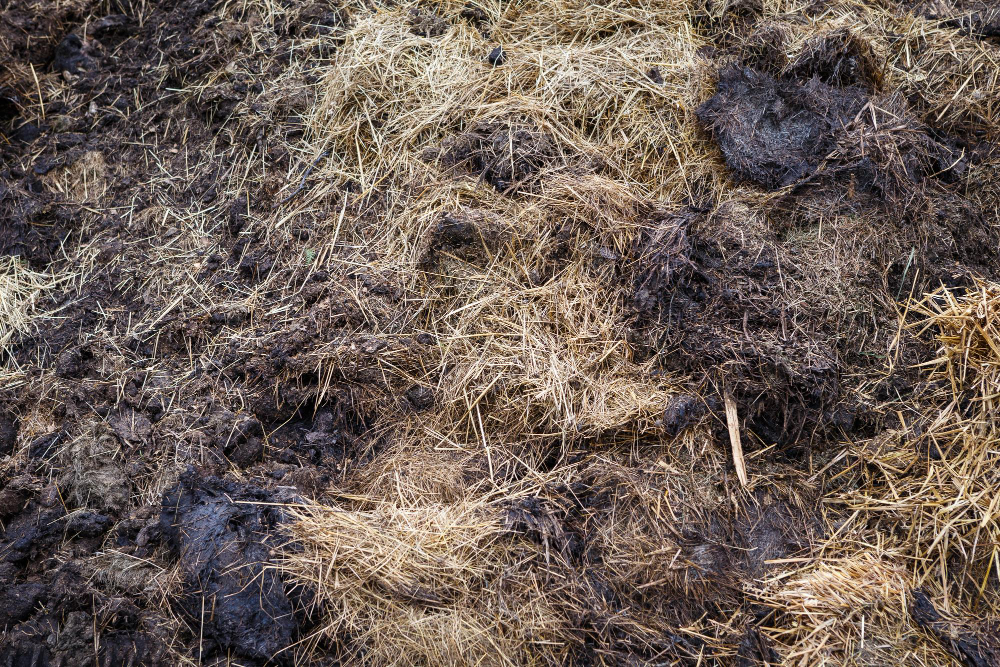
Mulching Vegetable Garden with Grass Clippings
It is simple, easy, and practical to mulch your vegetable garden with grass clippings. It’s eco-friendly to use grass clippings in your garden, and it’s healthier. In addition, your soil can benefit from its addition, water retention, and biodegradability.
Mulching Vegetable Garden with Leaves
With shredded leaves, you can mulch vegetable garden beds easily. Decomposing leaves into humus, a rich organic matter, is faster once they have been shredded. For weed suppression, compaction prevention, water retention, and soil insulation, about 2 inches of leaf mulch will suffice.
Mulching Vegetable Garden with Wood Chips
A garden can benefit from the addition of wood chips. Typically, wood chips are used as mulch on top of the soil. The chips are usually added 2-3 inches deep. Perennial vegetables benefit from wood chips, even though they’re not the most effective mulch for most vegetables.
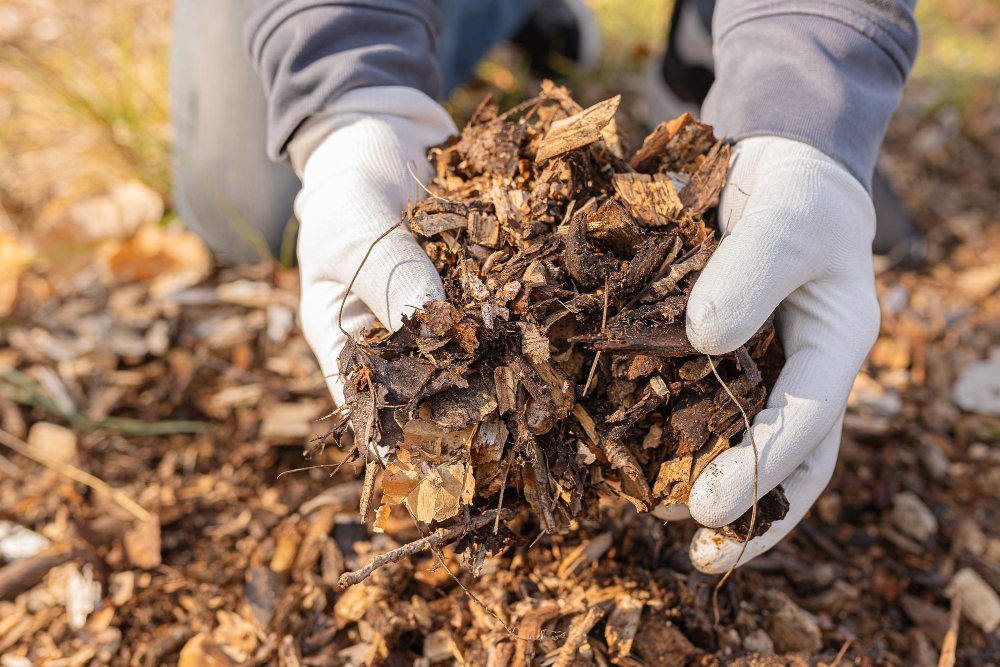
Why are Mulches Essential for Gardening?
The simple act of mulching can have big benefits for your garden.
- By mulching the vegetable garden, you can freshen up your beds with a layer of mulch before transplanting your seeds to your garden.
- In the presence of heat and wind, mulching the vegetable garden prevents evaporation. You’ll be able to decrease your watering dramatically with mulch.
- It fosters the drought tolerance of established plants and can also be critical to the success of new plants.
- Mulching the bed prevents weeds from growing. By mulching, you can quickly suppress shallow-rooted annual weeds.
- Mulching the vegetable garden prevents extreme temperature shifts, keeping roots healthier.
- Natural mulch material decomposes over time. Your plants benefit from it because it feeds the soil food web. Soil drainage gets better with organic matter, too.
- Mulching the vegetable garden protects your soil-grown plants from soil-borne diseases by preventing them from spreading through the water.
- We reduce landfill waste by using wood mulch when mulching the vegetable garden.
- A better-looking garden design can be achieved by mulching the vegetable garden.
What is the Best Mulch for a Vegetable Garden??
Your garden will thrive when you use the right mulch. Your choice of the best mulch for your vegetable garden should depend on your goals with our soil. For example, compost is the best organic mulch for a vegetable garden and is highly effective at building soil texture and suppressing weeds.
On the other hand, wood chips are great for mulching pathways, perennial garden beds, and shrubbery or fruit trees. Straw is lightweight, and it improves the soil when it decomposes. Straw mulch for the vegetable garden is perfect for cucumbers, winter squash, herbs, pumpkins, perennials, and pathways. Whereas weeds can be suppressed most effectively with newspapers, grass clippings contain nitrogen and break down quickly, making them ideal for mulching young vegetables.
How do You Apply Mulch to a Garden?
To mulch your vegetable garden properly, you should follow some steps. First, before applying mulch, remove any weeds from the area. After seeding a garden or flower bed with flowers or vegetables, wait a while before mulching, so the plants develop a bit.
Third, ensure the mulch does not touch the stems or leaves of plants after it has been applied to the desired depth. Pests and diseases may spread through contact with plants. Finally, ensure the mulch is firmly anchored by lightly watering it.
How Often Should Garden Mulch be Replaced?
Organic mulch will inevitably decompose over time, so it will need to be replaced at some point. No single mulch will last the same amount of time, but depending on the type and weather conditions, that timeframe can vary. It is best to observe the mulch’s condition at the beginning of spring so you can know when to replace it. It may last another year if it looks similar to when you laid it down. It is probably time to replace the mulch if it has broken into much smaller pieces.
What Garden Tools Do I Need for Mulching?
For transportation, you can use a wheelbarrow or garden cart. With a square-point shovel, you can move mulch materials like pebbles, sawdust, and wood chips. When it comes to straw mulch, a pitchfork works excellently.
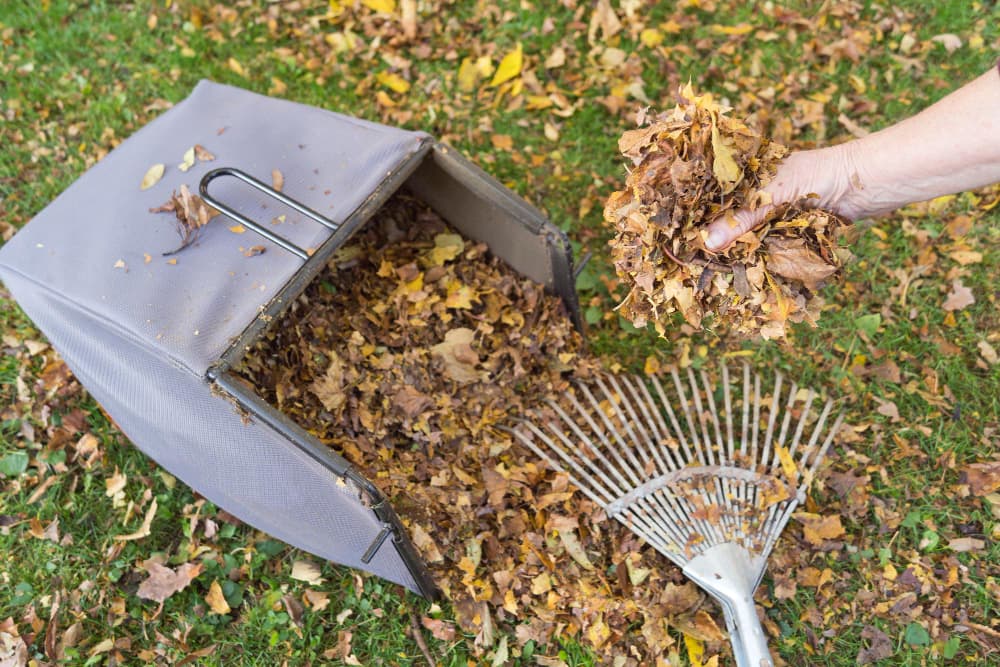
You will find it easiest to use a large scoop shovel whenever you want to move light, fine mulch. Digging in soil with shovels with round, pointed edges is more effective. A sturdy bow rake is the best tool for spreading mulch.
Does too Much Mulch Cause Problems for my Plants or Flower/Garden Beds?
Yes, it does. An excessive amount of mulching in the vegetable garden suffocates roots and kills them. Moreover, if you water lightly, the mulch layer will get wet while the soil stays dry, which will cause the roots in the soil to die.
Is Hay the Best Type of Mulch for Your Garden?
Flowers and vegetables thrive with hay mulch, but we cannot call it the best. Your needs will determine which mulch type is best for you.
Mulch can be a handy tool for organic gardeners. The benefits of mulch for gardens and plants are numerous. Finding the ideal mulch for your plants based on their needs and making them thrive is possible.
FAQs About Mulching at Home
Some of the most frequently asked questions are answered below.
Does Sheep’s Wool Work Well for Mulching in the Garden?
As a form of sheet mulching, sheep’s wool is suitable for the garden because it retains moisture and prevents weeds from growing. Sheep’s wool can also retain more heat during cold winters, which keeps roots warm and can help keep crops alive longer.
Are Cardboard Egg Trays Good for Garden Mulch?
Egg trays can be recycled as mulch, saving you money and reducing landfill waste. Compared to wood chips or straws, cardboard captures moisture more efficiently.
Are Slate Chippings a Good Garden Mulch?
In contrast to organic mulch, slate chipping is not biodegradable. Therefore, slate chippings won’t improve the fertility or structure of the soil, but they will conserve moisture and keep weeds under control. In most cases, they shouldn’t affect the PH level of soil or ponds.
What is the Disadvantage of Using Mulching in the Garden?
The use of mulch in the right circumstances certainly has some advantages but can also have some disadvantages.
- Putting down too much mulch can suffocate your vegetables.
- Organic and synthetic mulches can completely dehydrate the soil underneath them when layered too thickly.
- Stacking natural and artificial mulch too thick can overheat the soil.
- If you mulch too much, artificially or with eco-friendly mulch, the soil will lose oxygen, harming the roots.
- You could end up with flower beds infested with harmful pests if you use organic mulches.
- During their decay, sawdust and wood chips can take nitrogen out of the soil.
- Some mulch types can add harmful acidity to the soil, stunting the growth of plants.

